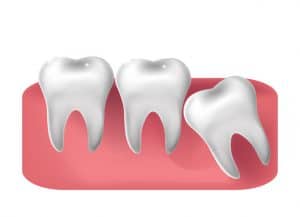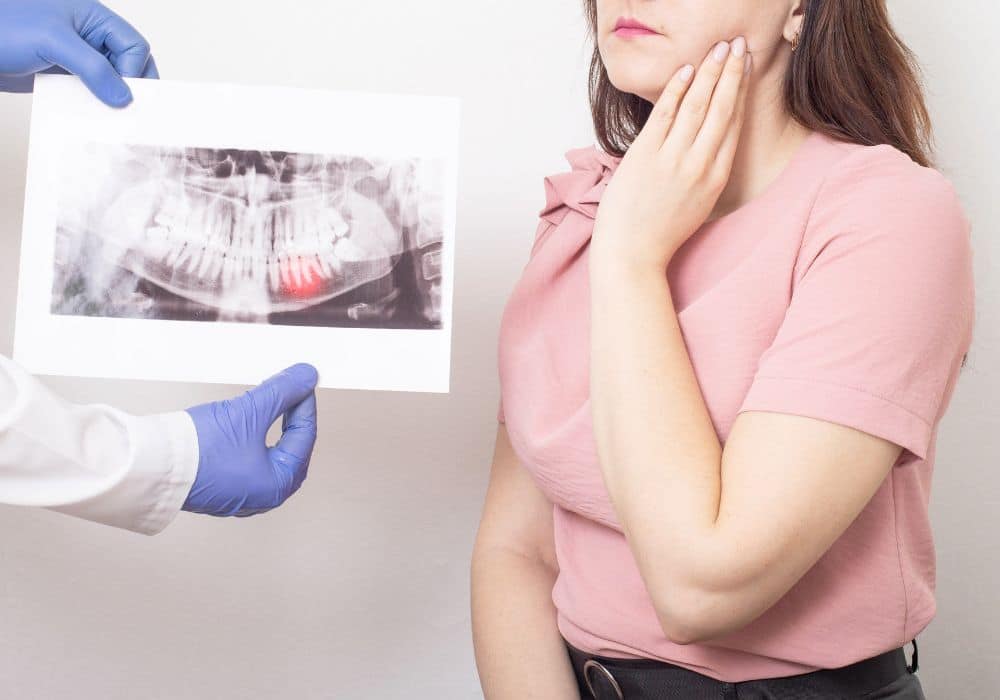Every year many people complain of pain due to wisdom teeth. Wisdom teeth removal may not be necessary for everyone, but when they become a problem, they must be removed as they can cause pain or other dental health issues that you must address.
But how do you know if your wisdom teeth need to be removed? Don’t worry; we’ve got your back.
This blog will share some indicators to help you understand if and when your wisdom teeth should be removed and that it’s time to visit the dentist.
What Are Wisdom Teeth?
Before we jump right into the signs you need to look out for, let us briefly understand wisdom teeth and their impact on your dental health.
A wisdom tooth is one of three molars in each quadrant of the human dental structure. It is set at the farthest corner, at the end of the three molars. Wisdom teeth erupt between late adolescence and early adolescence (usually between 18-24 years). Adults usually have four wisdom teeth. However, some adults may have none, less than four, or more than four wisdom teeth, in which case the extra tooth/teeth are referred to as supernumerary teeth.
If your wisdom teeth are healthy and properly positioned, they rarely cause pain and do not need
removal. Wisdom teeth eruption may cause pain in the following situations:
- Partial eruption: If your wisdom teeth do not break through your gums due to a lack of space, a flap of tissue may remain over the tooth. This condition is known as pericoronitis. This flap can cause gum tissue pain and swelling. It can also trap food and bacteria, leading to gum infection and pain.
- Impaction: If your jaw is too small to accommodate your wisdom teeth, they may become impacted or trapped and unable to fully erupt through your bone and gums. The partial eruption can cause stiffness and pain in the gums and jaw.
- Misalignment: Your wisdom teeth may emerge crooked or facing the wrong way. Symptoms of misalignment can include discomfort from crowding of other teeth, as well as pressure and pain in the mouth. If these wisdom teeth are tilted towards the cheek, they can cause severe cheek bite and ulceration of oral skin
5 Signs You Need to Remove Your Wisdom Teeth
Here are 5 signs that you need to get your wisdom teeth removed:
- Jaw pain: As wisdom teeth are the last of the teeth to erupt in the jaw, there is less space for their eruption, as a result many times they grow tilted or misaligned, pressing up against other teeth in front. This causes jaw pain as there is not enough space for these teeth to move and settle into place. You may experience jaw pain for several weeks and the pain may get worse with time. This pain can also radiate to ear and cause headaches. It becomes difficult to eat, drink, and talk when this happens. Also if few cases, it is difficult or painful to open the mouth normally. At that point, the dentist will need to take an x-ray to determine the position of your wisdom teeth and devise an appropriate treatment plan.
- Persistent bad breath: No matter how meticulous your oral hygiene is, the eruption of wisdom teeth can cause bad breath. But why is that? Wisdom teeth grow in particularly difficult-to-reach areas of the mouth as they are located at the back and often stay hidden behind the second molars. As a result, bacteria accumulate and fester in these areas, causing bad breath. You could make every effort to clean the back of your mouth. However, removing all the bacteria that accumulate in the back of the mouth when wisdom teeth emerge is nearly impossible. You may also experience a bad taste in your mouth caused by bacteria buildup and accumulation of pus.
- A crowded feeling in the mouth: Wisdom teeth commonly do not have enough room inside the jaw to grow properly. This causes them to push their way into tight spots in the back of the mouth, become impacted, or grow sideways, all of which can lead to overcrowding or make addressing overcrowding issues more difficult. Overcrowding can be alleviated by removing wisdom teeth and/or undergoing orthodontic treatment. The specific treatment for overcrowding is determined by the circumstances of the patient. However, it usually entails removing the wisdom teeth, followed by the placement of braces or clear aligners to correct crowding and alignment issues. In patients who have undergone orthodontic treatment in childhood, wisdom teeth are advised to be removed as they may cause crowding and change the alignment of other teeth.
- Gum irritation: When wisdom teeth partially erupt, it can lead to pericoronitis. So, because of pericoronitis, soft tissue grows over a partially erupted wisdom tooth. This flap of tissue is known as an operculum. Bacteria can get stuck beneath the operculum which can then enter the area around the tooth, causing infection and swelling. Food debris, bacteria, or plaque, a bacterial film that remains on teeth after eating, can all become trapped beneath the gums. If it is not removed, it can cause gum irritation and pain along the jawline and even may spread to the cheeks and neck in severe cases.
- Swelling in the face: You will most likely experience facial swelling if your tooth or gums become infected. If you’re not careful, the facial swelling caused by wisdom tooth pain can quickly escalate into a medical emergency. The swelling usually affects only the side of the face with the problematic wisdom tooth. Any facial swelling should be reported to a dentist as soon as possible. Otherwise, the infection may spread to nearby tissues or even your bloodstream. Malaligned wisdom teeth can lead to
development of cystic lesion or tumour in the jaw bone. This is a serious condition and requires immediate attention by your dentist/ oral surgeon. Living with tooth pain or discomfort is often unbearable; it disrupts your daily life and makes it difficult to enjoy almost anything. Wisdom teeth removal is usually the best solution to treat these symptoms. The key is to have the procedure performed by highly skilled, compassionate oral surgeons with years of experience removing wisdom teeth.
How Is The Surgery Done For Wisdom Tooth Removal?
So, if you have any of the above signs, book an appointment with Dr.Vikram Pandit of Pandit Clinic, Pune, to determine whether you require a wisdom tooth extraction. In addition to working at Pandit Clinic, Pune, as an oral and maxillofacial surgeon, Dr.Vikram Pandit also works at Pune’s most prestigious hospitals, including Poona Hospital and Research Centre, Ratna Memorial Hospital, and KEM Hospital.
If you want to know more about wisdom teeth problems and treatment, don’t hesitate to contact us at +918805980048 or book an appointment with Dr. Vikram Pandit.
Meet the Doctor
BDS, MDS Oral & Maxillofacial Surgeon
Dr. Vikram is a visiting consultant and consultant oral and maxillofacial surgeon at the top hospitals in Pune like Poona Hospital and Research Centre, Ratna Memorial Hospital, Pandit Clinic and KEM Hospital. Dr. Vikram has done clinical fellowship in craniofacial surgery with focus on surgery for cleft lip and palate deformities, orthognathic surgery and surgery for sleep related disordered breathing (SRDB). He has trained for advanced management for Facial Trauma, from Taiwan. He has also attended various seminars and done workshops related to Oral and Maxillofacial Surgery. Dr. Vikram is also a co- author of a chapter for a textbook. He has been invited as a speaker for number of conferences in India as well as Internationally.
Book Consultation

Consult Dr Vikram Pandit
Oral & Maxillofacial Surgeon
Book a consultation with Dr Vikram Pandit. At the consultation, Dr Vikram Pandit will:
- Dr. Vikram Pandit will first perform a thorough examination of your teeth, gums and jaw.
- Explain the problem to you.
- An X-Ray of your teeth will be taken if needed.
We recommend you openly discuss your concerns with Dr. Vikram.
During the consultation be prepared to discuss:
- Your medical conditions, drug allergies, and previous dental treatments.
- Current medications, vitamins, herbal supplements, if any.
- Likely outcomes, and any risks or potential complications.
You Might Be Interested In

The Ultimate Guide to Periodontal Disease
In today’s world, having a neat and clean appearance is a necessity as it marks our first impression, and as we all know the first

Maximizing the Lifespan of Your Dental Implants: A Guide to Post-Implant Care
Dental implants are a remarkable solution for replacing missing teeth, offering stability, functionality, and aesthetics akin to natural teeth. However, the journey to enjoying your









